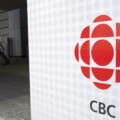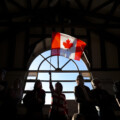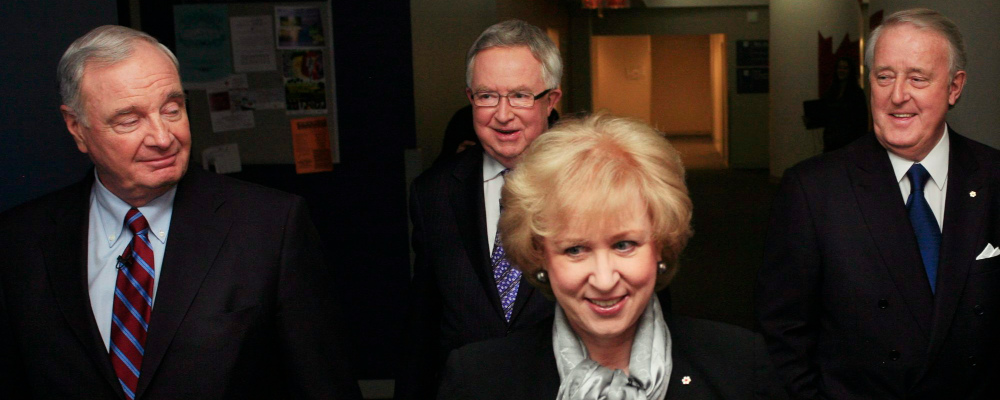I was a young newspaper reporter assigned to cover a speech by Prime Minister Pierre Elliott Trudeau and my editor said to wear a suit. My brother had bought me a plaid suit for my 21st birthday—dark blue with outlandish gold trim—and no one would be caught dead in it today. But it was the ’70s. This would be the only time I ever saw Trudeau in the flesh and it turned out to be memorable.
For the wrong reason.
He had won the 1974 election with a majority government and still had that rock-star persona about him. He made his way through the mob and I remember this well-endowed woman edging herself closer and closer. When Trudeau finally began to speak there were tons of media—the big dailies, radio, TV crews from the major networks—and one of those crews set up right beside me. We were on the floor cheek-by-jowl—there were no chairs for us—the cameraman inches from my face. A few minutes in he passed a handwritten note to the reporter standing with him. I could only make out the first few words.
“I wonder if this guy next to me …”
I couldn’t see what came after that but he was referring to me! That night Trudeau spoke at length and I had to take notes for a story to write but throughout the whole thing my mind was focused on that slip of paper.
The next time I found myself in the presence of someone who had occupied the highest office in the land was during the 1979 election campaign. Former PM John Diefenbaker, 83, was doing a rally. Joe Clark, leader of what we then called the Progressive Conservatives, was trying to usurp from office the same Trudeau whose majority government had grown stale after five years.
That night I was in the crowd and Dief didn’t disappoint as he vilified Pierre and his young wife Margaret, and brought the house down. He had his audience in stitches. The old warhorse was so funny he could have done his routine on The Tonight Show and not once throughout his entire monologue did he mention Joe Clark, not until the end when he urged everyone to vote for him. Clark, you see, was a Red Tory and Dief was not.
The 39-year-old Clark would become our youngest-ever prime minister, relegating Pierre Trudeau to the opposition for the only time in his career. Alas, the Conservative minority government didn’t hold. Six months later Clark lost a no-confidence vote in the House, triggering another election which returned Trudeau to power.
Trudeau would remain in office until 1984 when John Turner became PM and went up against Brian Mulroney who had replaced Clark as Tory Leader.
I once saw Turner when he was older. He appeared on behalf of an author friend who published a book about Canadian elections and Turner spoke at the launch. But my memory of him is from much earlier. Over the years I did a lot of communications seminars and used examples from politicians to illustrate both the good and bad. In that 1984 campaign Turner said:
- Canada is a country without horizons.
- It’s a great country where a young man can come, whatever his religion, whatever his sex.
- God has given us the water and the prairies. He’s given us our forests, our minerals, our fish. He’s given us reasonably intelligent people.
Needless to say, that year the Conservatives won the biggest majority in Canadian history with 211 seats. The Liberals took 40.
The same year my first book VICTIMS: The Orphans of Justice was released and went big-time into crimes committed by violent offenders out on early release. It was critical of the government—Trudeau’s Liberals—and no elected official would talk to me when I was doing my research. However, the official opposition Tories were very helpful—until they won the election and returning calls was no longer deemed a priority. But I did receive a letter from Brian Mulroney thanking me for my work. Still, that’s not my chief memory of Mulroney which came courtesy of my daughter who was three when he got elected. When I told her about our new PM and mentioned his name, she could only say “Macaroni.”
He remained in office until 1993 when Kim Campbell, Canada’s only woman PM, came to power and she led the Conservatives in the next election, an unmitigated disaster. The Tories went from a majority government to two seats in the House. The joke of the day? What’s the difference between the Tory caucus and a school bus? Answer: 48 seats.
That was when Jean Chretien won the first of three consecutive elections, all majorities. Preston Manning, dissatisfied with the way the Tories were going, had founded the Reform Party which split the right-of-centre vote, thus ensuring those Liberal victories.
Chretien, the little guy from Shawinigan, was a character. When justice minister, he was one of those Cabinet members who wanted nothing to do with me or anyone associated with me because of my book. But I have a couple of stories to relate involving foreign nationals who had met him.
The first time was in 1997 in Israel. I was at Ein Gedi, taking in the hot springs by the Dead Sea, and involved in a conversation with a businessman from India. He spoke English but with a heavy accent.
“Your Prime Minister…Cheh Cheh,” he said.
“You mean Jean Chretien?” I replied and he nodded. He had attended a Chretien-led trade mission to India the year before and came away unimpressed. I didn’t make much of it but a few years later I was in Oslo, Norway interviewing an executive from Norsk Hydro, the big energy company. He too had been present at a meeting presided by Chretien and when the name was mentioned he just shook his head and laughed out loud.
When Chretien retired Paul Martin was ensconced as new PM. Now I worked closely with former Toronto police chief Julian Fantino on his memoir DUTY – The Life of a Cop. Fantino told me a story about Martin that got into the book, about his meeting with Prime Minister Martin when he was chief. Fantino had a carefully prepared list of concerns—length of trials, disclosure obligations for police, gun violence, child pornography, high-risk offenders, terrorism, etc.
That meeting lasted over an hour and it was just him and me. I came out of that meeting really buoyed and felt much had been accomplished. It was an encouraging meeting and the prime minister told me I’d hear back from him on these issues. But I never heard from him again. Or anyone on his staff.
Fantino was later a member of Stephen Harper’s Cabinet, and speaking of Harper, the only time I saw him in person was one afternoon after emerging from a meeting at Queen’s Park in Toronto. The Queen—Elizabeth II—was in town and marching down the boulevard, the PM beside her. Seeing her in the flesh revealed to me just how small she was and also how tall Harper was. But I distinctly remember Harper looking stiff while the Queen wore a smile that seemed genuine.
Which brings us to the current PM. Not long after his election to the House of Commons but before his becoming Liberal Leader, he took a swipe at Julian Fantino on national television. Our book had just been published. When Fantino was asked who was the chief beneficiary of the Charter of Rights and Freedoms, he said the Hells Angels. The Charter, you see, made it much more difficult to prosecute members of a criminal organization, and that went for the Mafia too.
New MP Justin Trudeau would have none of it. Fantino (and by extension yours truly) had sullied the memory of his late father. It seemed to me the younger Trudeau knew precious little about the workings of the criminal justice system and since becoming PM he has told us such things as:
- The budget will balance itself.
- How he admires China.
- That a large percentage of small businesses are just ways for wealthier Canadians to save on their taxes.
And this gem: “I am not going to talk about this anymore because I am setting a new standard for transparency.”

But let’s return to that handwritten note passed before my eyes the time I covered his father’s speech wearing a blue-plaid-with-gold-trim suit. Finally, after agonizing about the contents of that slip of paper during the entire speech from the prime minister, I managed to catch the rest of the message.
“I wonder if this guy next to me…is wearing matching socks.”
Humiliating. Nevertheless, when the PM finished I told the cameraman from that TV crew I was indeed wearing matching socks and he laughed. Now we all know Justin Trudeau fancies colourful socks. He wears them all the time. But has anyone ever bothered to check if the same colour is on each foot?
Maybe it’s time they did.
Or better still maybe he should try a pair of compression socks which are good for improving blood flow. When he decides to throw in the towel after taking a long walk in the snow—as his father did in 1984—he will need to keep warm. Winters are cold in Ottawa and this year might be the coldest ever.
Recommended for You

Need to Know: Legacy media has a diversity problem

‘A celebration of the spirit of Alberta’: Ryan Hastman on the political, economic, and cultural importance of the Calgary Stampede

‘Can we actually be an independent country?’: Michael Ignatieff on the 60th anniversary of Lament for a Nation

Fred DeLorey: Why the NDP may be in even bigger trouble than we think



